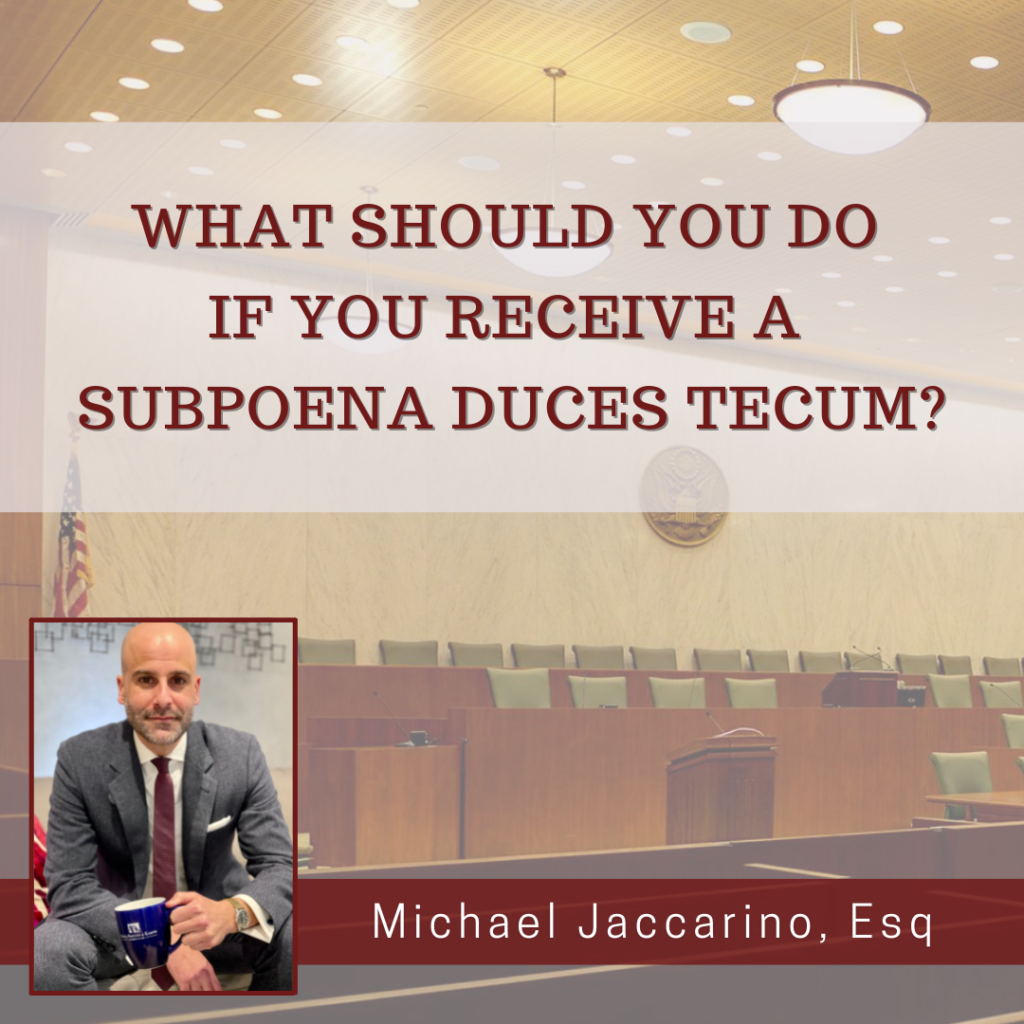ON BEHALF OF MICHAEL JACCARINO, ESQ. OF AIDALA, BERTUNA & KAMINS, PC POSTED IN BLOG ON MONDAY JUNE 27, 2022
What Should You Do If You Receive a Subpoena Duces Tecum?
First, contact a lawyer at Aidala, Bertuna & Kamins!
The service of subpoenas is perhaps the most obvious way federal, state, or local government offices use their power. But if you are someone who has received one, it can be unpleasant and downright scary. Generally, a subpoena is an official document, sometimes signed by a judge, attorney, or grand jury foreman, seeking the production of documents and / or your physical appearance at an official proceeding.
Perhaps, your subpoena may have been served by the U.S. Attorney’s Office, the Securities Exchange Commission (SEC), the New York State Attorney General’s Office or a New York State District Attorney’s Office. But, no matter which different agency served it, the question you have is always the same: What do I do now?
A subpoena is a legal document that carries with it enormous obligations and significant consequences. As a general concept, in the event a subpoena is not complied with, criminal or civil punishment can result. In addition, you may have an urge to contact the author of the subpoena to talk and ask questions. Suppress that urge.
What is a subpoena duces tecum?
A subpoena duces tecum is a type of subpoena that requires the witness to produce a document or documents pertinent to a proceeding. From the Latin duces tecum, meaning “you shall bring with you.”
Pursuant to the CPL, both the Assistant District Attorney (“ADA”) and the Defense Counsel, and the Court can issue a subpoena duces tecum to obtain potential physical evidence. A subpoena duces tecum is a subpoena that requires the witness to produce specified evidence in court. A subpoena duces tecum is a powerful tool as it is not limited to evidence that is discoverable as Brady or Rosario material.
The definition of a subpoena duces tecum is found in CPL Article 610(3):
As used in this article, “subpoena” includes a “subpoena duces tecum.” A subpoena duces tecum is a subpoena requiring the witness to bring with him and produce specified physical evidence.
If a company in New York State receives a subpoena demanding documents — also known as a “subpoena duces tecum” — in a lawsuit to which the company is not a party, the company should, among other actions:
- determine whether the subpoena was properly served on it;
- serve objection(s) within 20 days of receipt of the subpoena, unless a written stipulation is obtained extending the time to respond;
- identify whether all or part of the demand is improper, and if only a part or a portion is objected to, specify that part or portion, while responding to remainder of the demand;
- specify the bases for objection to item(s) being objected to;
- notify the demanding party if documents are being withheld; and
- identify, unless such identification would compromise a privilege, for each document withheld, the type of document, the general subject matter of the document, the date of the document, and such other information as is sufficient to identify the document.
Michael Jaccarino, and the criminal defense attorneys at Aidala, Bertuna & Kamins, PC, have decades of experience.
For more information or more fact-specific discussions, call our office and ask to speak with attorney Michael Jaccarino.



